
category_news
Teams announcement Food Systems Innovation Challenge
In the Food System Innovation Challenge, 18 teams from 9 different universities have been selected to implement their innovative solutions in the food systems through their project. With mentoring from experts in the field and funding (up to 2500 euro), they are working on their projects starting from April until September 2024, with the Grand Finals on 30 September 2024 on Wageningen Campus. Read more about the teams and their goals for this student challenge below!
Esalq-USP, Brazil
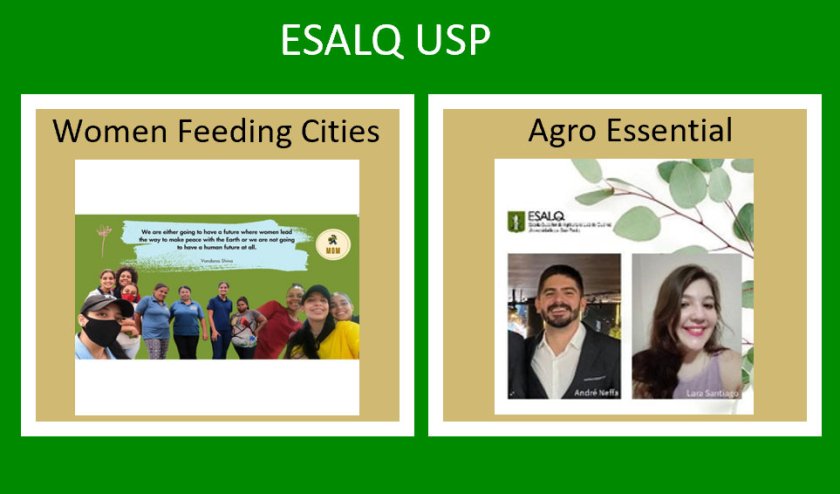
AgroEssential
This team from Brazil aims to assess the efficacy of sustainably produced essential oils, particularly d-limonene from citrus and Spiked pepper (Piper Aduncum), in controlling pests and diseases in horticultural plants, while also investigating their potential to enhance nutritional content through increased carotenoid and chlorophyll levels, offering a natural solution for sustainable food cultivation with minimal environmental impact.
Women Feeding Cities
The Women Feeding Cities project aims to empower unemployed women as leaders in urban agriculture, leveraging eco-feminist and agro-ecological principles to repurpose underutilised urban areas for sustainable food production, economic empowerment, and community resilience, facilitated through an innovative mobile app connecting women with available land and markets for their produce.
Lukenya University, Kenya
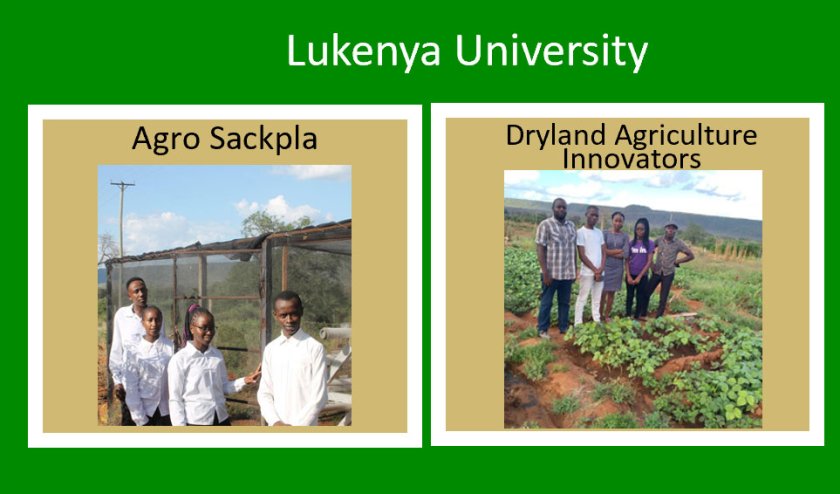
AGRO SACKPLA
AGRO SACKPLA team will try to introduce an innovative urban farming technique, combining smart agriculture principles with sack farming and recycled plastics, to address food insecurity by maximising crop production through efficient water and nutrient management in urban areas, utilising a central layer of pebbles and recycled plastic water containers for irrigation, while also promoting the cultivation of indigenous drought-resistant crops like Amaranthus Retroflexus.
DRYLAND AGRICULTURE INNOVATORS
This project aims to empower small-scale farmers in Kenya's arid regions through regenerative agriculture techniques, focusing on water conservation, soil health, and inclusive community development to address food insecurity, poverty, and environmental degradation while advancing SDG’s, particularly those related to zero hunger, gender equality, and climate action.
University of Abuja, Nigeria
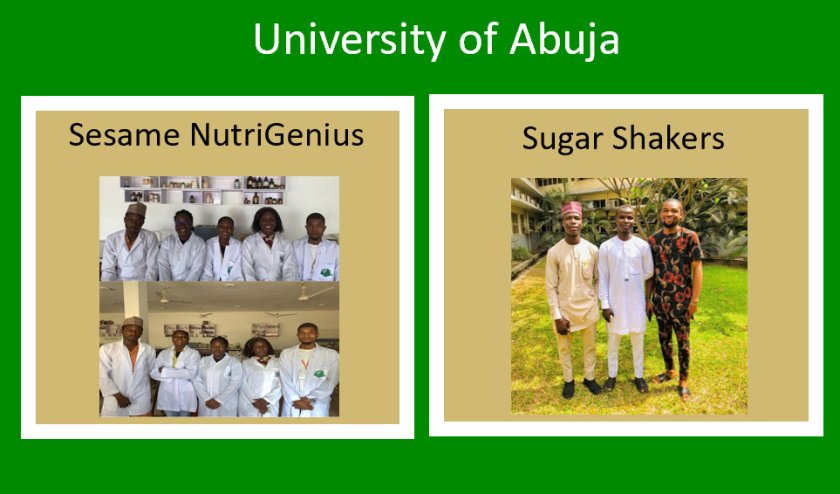
Sugar Shakers
First team from Nigeria seeks to address the rising demand for alternatives to refined sugars by producing date syrup as a safe and quality sweetener, implementing a Hazard analysis and critical control points (HACCP) system to ensure food safety, while exploring innovative applications of date syrup in sweets and chocolate and promoting its health benefits and contribution to a circular food system in Nigeria.
Sesame NutriGenius Team
Team NutriGenius aims to develop innovative sesame-based food products tailored for individuals with diabetes, addressing nutritional deficiencies and dietary restrictions while enhancing overall health outcomes, through research into creative processing techniques and sensory evaluation to ensure consumer acceptance and market viability.
Wollo University, Ethiopia
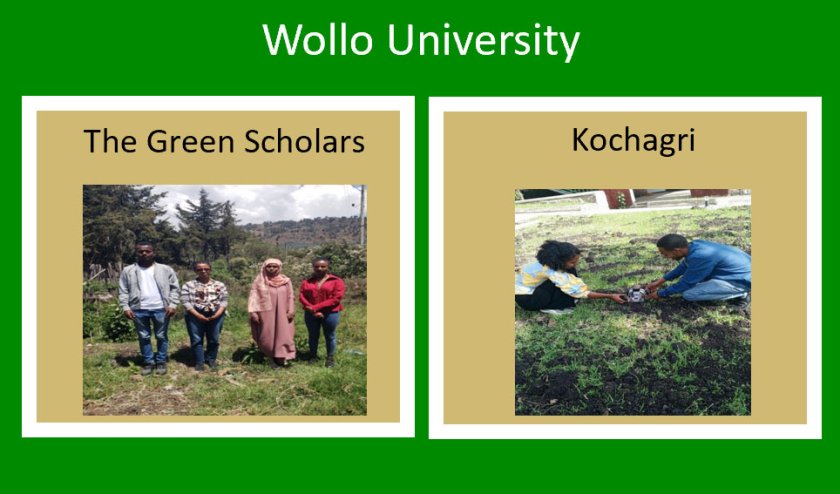
KOCHAGRI
Kochagri team plans to develop a solar-powered line seeder field robot to address challenges such as inconsistent seeding practices, limited precision agriculture, high operational costs, labour shortages, and inefficient resource use by offering autonomous line seeding operations with precise navigation, seed and fertiliser dispensing, and real-time data monitoring, ultimately enhancing efficiency, sustainability, and productivity in Ethiopian agriculture.
The Green Scholars
The project aims to enhance child nutrition and education in the town of Dessie in Ethiopia, through the establishment of organic school gardens. They plan to integrate hands-on learning experience, promoting sustainable food systems, fostering environmental stewardship, and improving access to fresh and nutritious vegetables for students and the community, with innovative approaches such as utilising organic fertilisers from local farmers, implementing vertical and horizontal gardens, and conducting home gardening initiatives supervised by health workers.
Anton de Kom Universiteit, Suriname
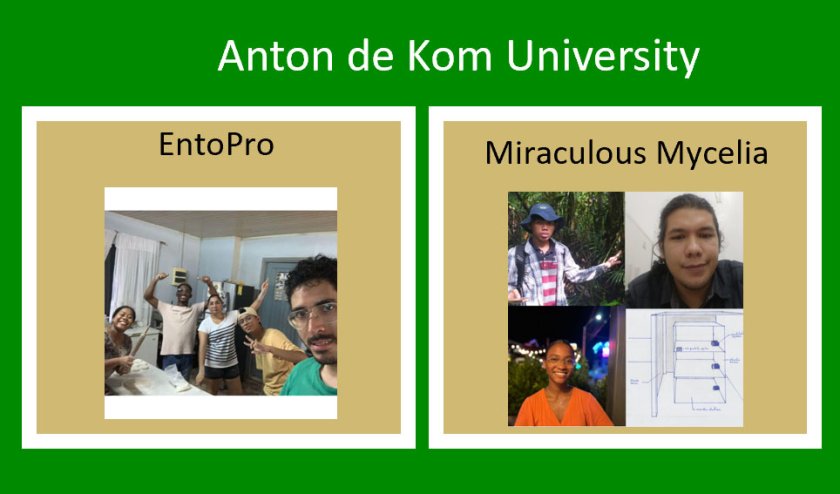
Miraculous Mycelia
Innovate Suriname's food systems by repurposing rice husks, a prevalent organic waste from the rice industry, for mushroom cultivation, offering a sustainable solution to waste management while providing a renewable source of nutritious food, natural fertiliser, and income generation for communities, with goals including waste reduction, circular system implementation, and cost-effective, community-based solutions.
EntoPro
The EntoPro team aims to revolutionise Suriname's animal feed sector by cultivating Black Soldier Fly larvae as a sustainable substitute for imported raw protein feed, addressing challenges in feed production and waste management while promoting economic growth and environmental sustainability through the utilisation of locally sourced materials and innovative insect-based feed formulations.
University of Ghana, Ghana
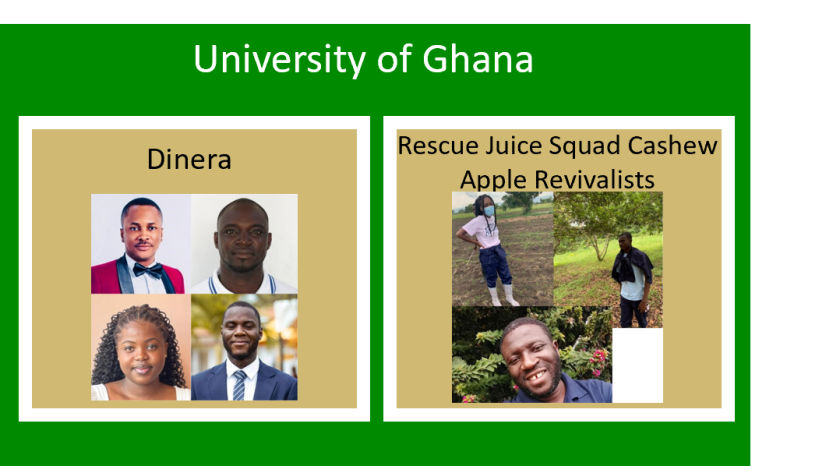
Rescue Juice Squad Cashew Apple Revivalists
The Rescue Juice Squad Cashew Apple Revivalists project aims to address food loss and economic opportunity in Ghana's cashew industry by innovatively processing underutilised cashew apples into nutritious juice, leveraging local technologies and knowledge to minimise waste, empower women in rural areas, and create sustainable economic opportunities across the value chain, thereby contributing to food security, nutrition, and environmental sustainability.
DINERA
The Dinera team aims to revolutionise food security and safety through cutting-edge technologies like artificial intelligence and blockchain, creating collaboration between academia, government, and industry using an app with AI at its core. Dinera will have a research platform and an interactive chat application interface.
Makerere University, Uganda
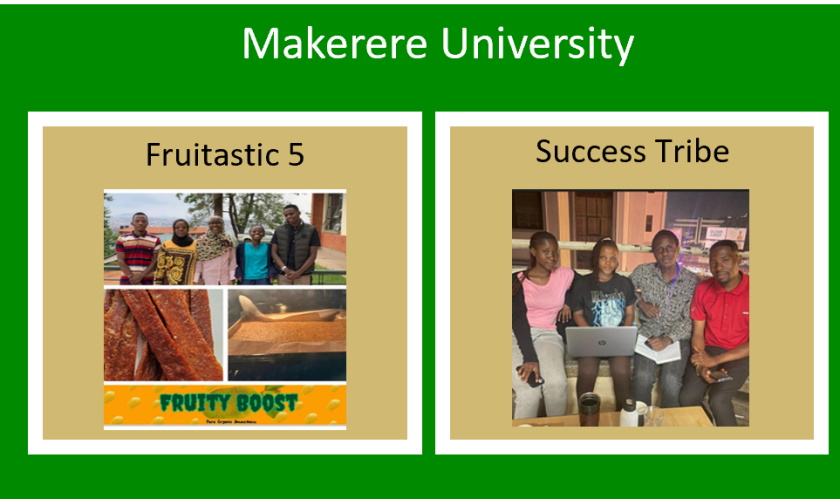
Fruitastic 5
Fruitastic 5's goal is to combat food waste in Uganda by transforming overripe jackfruits into nutritious jackfruit snacks, thereby extending their shelf life, promoting healthy eating, and boosting economic benefits for local farmers and vendors.
Success Tribe
Success Tribe aims to revolutionise the tomato supply chain in Busega market by reducing wastage, improving supply chain efficiency, and promoting value addition through ketchup production, thereby enhancing food security, economic opportunities, and market stability for all stakeholders involved.
Wageningen University & Research, Netherlands
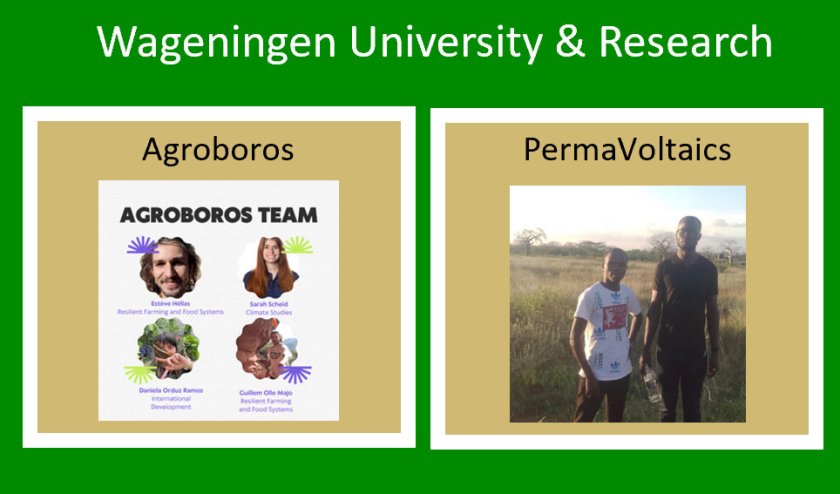
PermaVoltaics
The project will try to evaluate the impact of photovoltaic systems on permaculture crop plots compared to traditional permaculture plots, with the goal of assessing their performance and potential for enhancing food systems sustainability.
Agroboros: Food of future
Agroboros team seeks to bridge the generational gap in agriculture by reconnecting young generations with modern and cultural farming practices through an immersive educational program, while fostering partnerships between urban and rural farmers, educational entities, and the community to promote agroecological practices and livelihood diversification.
Kathmandu University, Nepal
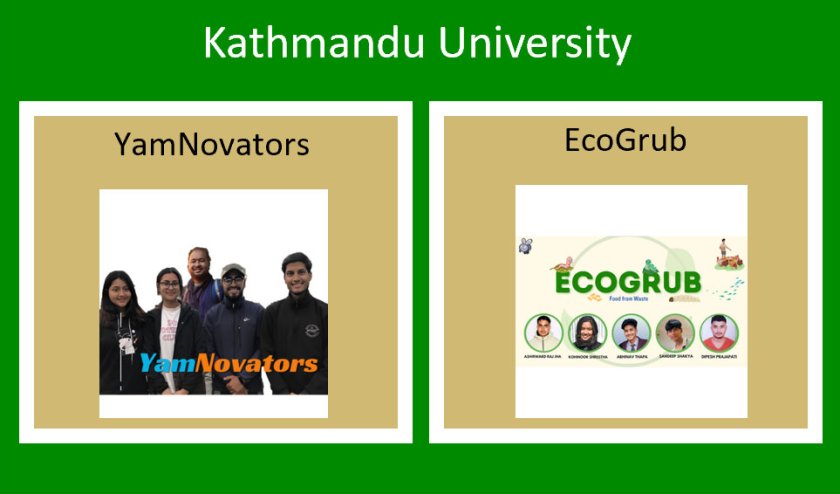
Eco Grub
Eco Grub team wants to revolutionise the feed industry by utilising Black Soldier Fly (BSF) larvae to convert unorganised organic waste into affordable, protein-rich feeds for poultry, pig farming, and fisheries, thereby addressing high feed costs, reducing land and water use, and minimising environmental impact.
YamNovators
YamNovators seeks to uplift the marginalised Chepang community in Nepal by transforming indigenous yams into diverse marketable products, generating sustainable income, and promoting food security through product diversification and employment opportunities.
